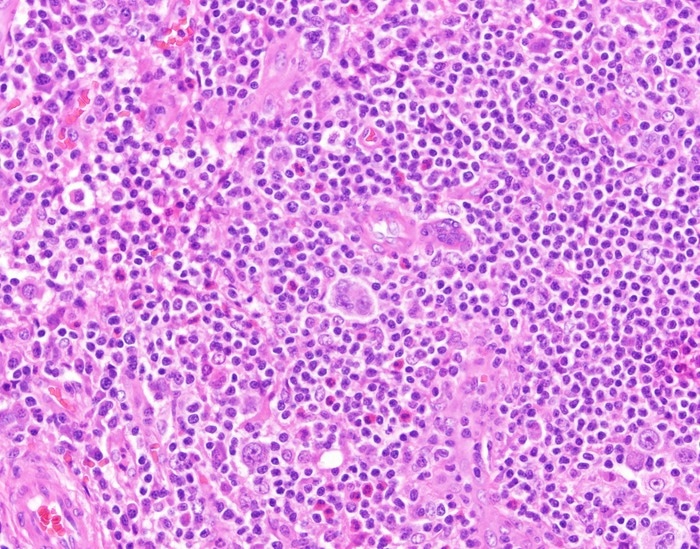To develop the most efficacious, personalized treatment plans for patients with Hodgkin lymphoma or other cancers, researchers and clinicians must first understand the genetic changes that cause cancer to develop.
 CHL- Classic Hodgkin Lymphoma. Image Credit: Sylvester Comprehensive Cancer Center.
CHL- Classic Hodgkin Lymphoma. Image Credit: Sylvester Comprehensive Cancer Center.
That picture, according to scientists at the University of Miami Miller School of Medicine’s Sylvester Comprehensive Cancer Center, becomes much clearer when whole genome sequencing—rather than the current standard, exome sequencing—is used to detect the changes driving cancer.
Exome sequencing, which interprets only protein-coding genes, can identify some specific mutations and other variants that promote cancer development, but a multicenter group guided by researchers at Sylvester and other cancer research centers discovered that whole genome sequencing (WGS) can read virtually all mutations in both protein-coding and noncoding regions of the genome, as well as identify other changes that can lead to cancer development.
We found many genomic events that had never been recorded before. It’s the best technology we’ve found to identify new cancer drivers.”
Dr Craig Moskowitz, Study Co-Author and Physician-in-Chief, Oncology Service Line, Sylvester Comprehensive Cancer Center
Dr Craig Moskowitz is also a Professor of Medicine at the Miller School. The study was published in the journal Blood Cancer Discovery.
Exome sequencing has indeed been exceptionally effective in determining point mutations and other cancer-causing variants but it provides an inaccurate picture. Noncoding genomic region mutations can also influence gene expression. Furthermore, WGS detects a broad range of structural variations, including chromothripsis, a condition in which damaged chromosomes resemble sledgehammers.
The research found mutational signatures associated with chemotherapy as well as many of these issues in cHL. WGS revealed how the cancers evolved over time. Reconstructing tumor chronology may be important in treatment selection.
It’s important to know how a tumor developed over time. We need to know which mutations were acquired and in what order. If we prescribe a targeted therapy, we want it to target genomic alterations that are shared throughout the tumor, rather than the subclones that came later and are relatively rare.”
Dr Francesco Maura, Study First Author and Assistant Professor, Medicine, Miller School of Medicine—University of Miami
Dr Francesco Maura is the co-leader of the Myeloma Genomic Lab at Sylvester.
The researchers developed a sophisticated system for isolating and studying the rare Hodgkin and Reed Sternberg cells observed in classic Hodgkin lymphoma (cHL) for this proof-of-concept study. They believe that combining this approach with WGS would provide numerous novel clues into cHL and other cancers.
Cancers are incredibly complex diseases, and we still have a long way to go before we fully understand them. By leveraging WGS, we can better assess tumor evolution, identify structural issues and hopefully gain new therapeutic insights.”
C. Ola Landgren MD, Study Co-Author and Director, Myeloma Research Institute
C. Ola Landgren is also the co-leader of the Translational and Clinical Oncology Research Program.
Source:
Journal reference:
Maura, F., et al. (2023) Molecular evolution of classic Hodgkin lymphoma revealed through whole genome sequencing of Hodgkin and Reed Sternberg cells. Blood Cancer Discovery. doi.org/10.1158/2643-3230.BCD-22-0128.